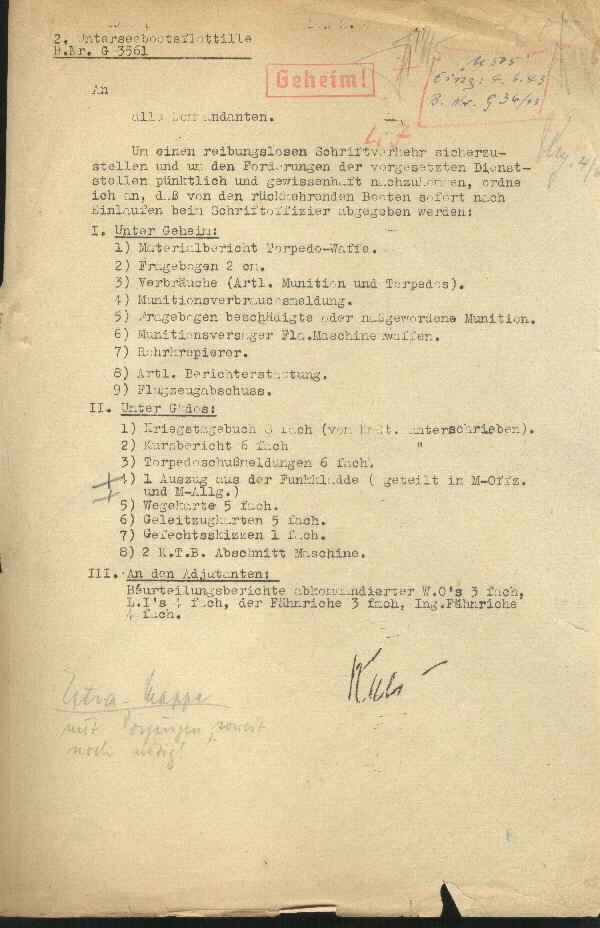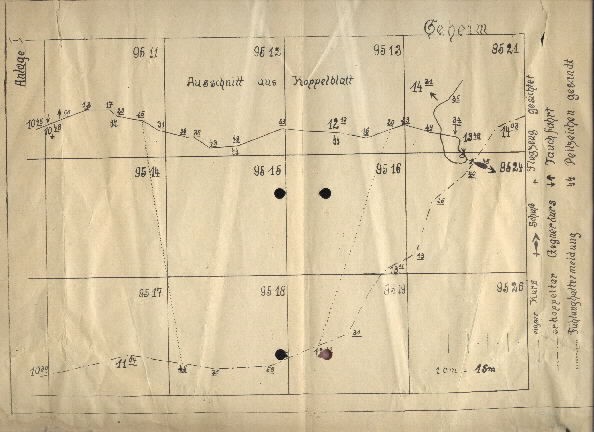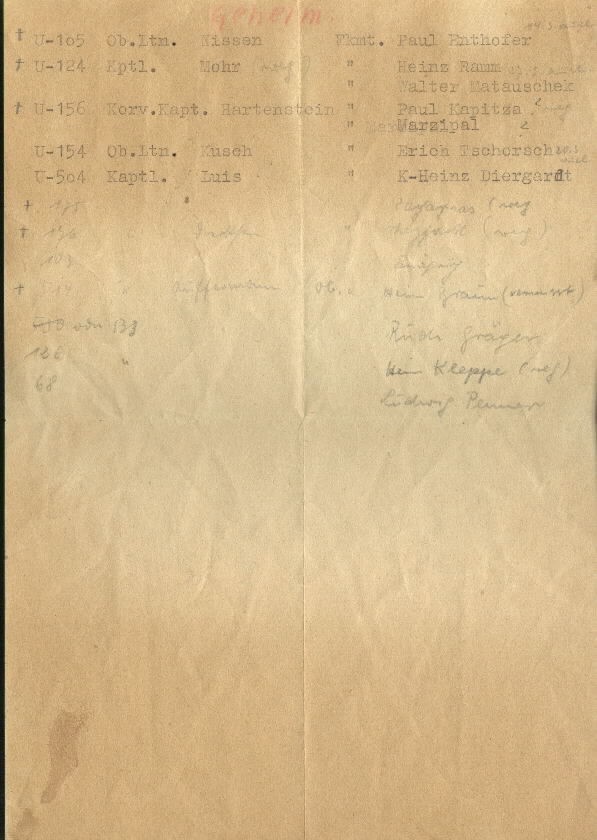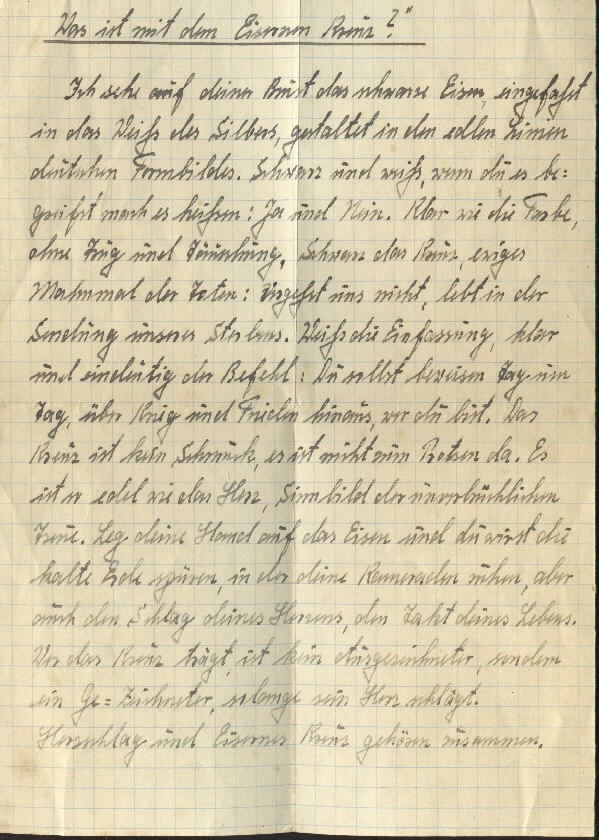
The Navy Department Library
U-505, Miscellaneous Documents
Report order
Movement Chart
List of other submarines with their commanding officers and radio men
Radio Room Instructions
Thoughts on the Iron Cross

Second Submarine Flotilla [Formerly] Secret! [Subsequently Declassified]
B. No. G 3561
“U-505”
Received: 4 June 1943
B. No. G 36/43
To all [Submarine] Commanders,
In order to guarantee smooth written exchanges and to follow orders of superior officers on time and conscientiously, I hereby order that all boats returning to port immediately surrender the following material to the [responsible officer]:
I. Secret:
1. Torpedoes material report
2. Questionnaire, 2 cm
3. Expenditure of artillery ammunition and torpedoes
4. Report of ammunition used
5. Questionnaire about damaged or wet ammunition
6. Failing ammunition flak machine guns
7. Barrel bursts
8. Artillery report
9. Shot-down aircraft
II. [Gkdos]:
1. War diary, eight copies (signed by Commander)
2. Short report, six copies (signed by Commander)
3. Torpedo reports, six copies
4. One excerpt from radio book (divided into officers and sailors)
5. Map of route traveled, five copies
6. Escorts map, five copies
7. Battle sketches, one copy
8. Two [illegible abbrivation]
III. To the officer’s aide:
Evaluation reports of commaning watch officers (three copies), head engineer (four copies), midshipmen (three copies), and engineering midshipmen (four copies).
[Signature illegible]
[pencil handwriting] Use extra folder if necessary!

[The chart above depicts the course of movement during an attack by the submarine. The upper line shows the U-boat’s course, starting at 10:45 in the morning to 14.31 (2:31 p.m.). The lower line shows an opponent’s course. Direction reports were given twice and are shown by the spotted lines. The cross (at 10:48) shows that an airplane had been sighted; accordingly, the vessel submerged and returned to the surface a little later (indicated by the arrows). Moving across different quadrants, at approximately 13:48 (1:48 p.m.), a torpedo was fired against the enemy. The continuing line of the enemy vessel’s course indicates that this may have been a miss, forcing the submarine to change course in a clockwise movement towards the north.]

[The document transcribed below is a list of other German submarines and their respective commanders and radio men. Some of the boats have been marked as obviously lost at sea. U-105 through U-504 are typed, the rest and what is written in brackets is handwriting (pencil)]
[Formerly] Secret [Subsequently Declassified]
| † | U-105 | Jr. Lieutenant Nissen | Radio Mate Paul Enthofer | 14 March [illegible] |
| † | U-124 | Lieutenant Mohr (gone) | Radio Mate Heinz Ramm Radio Mate Walter Matauschek |
27 March [illegible] |
| † | U-156 | Lieutenant Cmdr. Hartenstein | Radio Mate Paul Kapitza ? gone Radio Mate Marzipal |
|
| U-154 | Jr. Lieutenant Kusch | Radio Mate Erich Tschorsch | 20 March [illegible] | |
| U-504 | Lieutenant Luis | Radio Mate K[arl]-Heinz Diergardt | ||
| † | 175 | Zagarias | (gone) | |
| † | 176 | Lieutenant [illegible] | Radio Mate [illegible] | (gone) |
| 103 | [illegible] | |||
| † | 514 | Lieutenant Auffermann | Senior Radio Mate Heinz Braun | (missing) |
| 533 | Rudi Gräger | |||
| 126 | Hein Kleppe | (gone) | ||
| 68 | Ludwig Penner |
![Radio journal manual [page 1] Radio journal manual [page 1]](/content/history/nhhc/research/library/exhibits/documents-captured-on-german-submarine-u-505/miscellaneous-documents/_jcr_content/body/image_2.img.jpg/1473350433456.jpg)
German Reichspost
Messages for radio rooms
(During wartime to be published on request)
Edited and published by the Central Reichspost Agency, Berlin-Tempelhof
Year of publication 1942, Berlin, 1 December, Issue 6
Contents
Part A. No. 11. Usage of radio journal. – No. 12. Operating times of radio broadcast stations. – No. 13. Short message signature of German radio broadcast stations. – No. 14. Change in times of broadcast by radio station Norddeich [German coastal town on the North Sea] Radio. – No. 15. Maintenance and charge of emergency battery.
Part B. No. 16. Correction.
Notice rules of procedure for [illegible abbrivations]
(Messages for radio rooms No. 1/1939 3a, No. 8a/1939 160, No. 1/1940 6 and No. 9/1940 56)
Part A. News and Orders
No. 11. Usage of radio journal
There is reason to point out the careful usage of the radio journal. The rules of procedure in all of their range will also have to be obeyed by part-time radiomen. In the future, all radiomen will be held accountable for insufficient use of the radio journal.
The most important rules of procedure, supplemented by explanatory text, are noted in the following:
![Radio journal manual [page 2 and 3] Radio journal manual [page 2 and 3]](/content/history/nhhc/research/library/exhibits/documents-captured-on-german-submarine-u-505/miscellaneous-documents/_jcr_content/body/image_3.img.jpg/1473350602560.jpg)
[Page 2]
1. On board any vessel carrying a radio, a radio journal has to be used. It is currently written without a copy (cf. No. 5/1942 8). The radio journal is an official document. All entries must be written legibly and with strict care. Erasing is forbidden. If entries have to be corrected, they are to be crossed out and replaced by the correct entry.
2. The title paragraph of the radio journal must include for every campaign:
a. Name of the vessel,
b. Name of the Captain,
c. Name of the radioman or men (which will in brackets include the initials to be used for the journal entries),
d. Course of vessel – if known,
e. Remarks about the correct condition of the radio (including emergency battery and automatic emergency radio),
f. Remarks on the working hours that have to comply with the orders (see No. 12 in this issue).
If a radioman has to quit service during the campaign, or if a new radioman is starting service, this must be included in the title paragraph, with day and time (for example, “from 5 November 1430 MGZ [?] to 10 November 0800 MGZ radioman … out of work due to illness,” or “from 6 November until end of journey, additional radioman … (with initials in brackets), uninterrupted radio service”).
Entries such as “Second radioman on board, uninterrupted watch is being held” are not sufficient.
3. Using the exact time (MGZ), transmitting wavelengths and the calling signatures of the sending or receiving broadcast station, the radio journal has to include:
a. transcription of your radio transmissions,
b. overheard conversations of importance or general relevance,
c. reception difficulties with your radio transmitter
[Page 3]
d. overheard problems in radio conversations between other broadcasting stations,
e. collective calls and one-line orders of coastal broadcasting stations, including the transmitted signatures,
f. incidents concerning the general broadcasting or the security of human life on or [in aircraft] above the sea,
g. in full coverage: DZZA-, DZZN-, DZZO- [illegible abbrivations] et al. broadcasts, emergency calls, emergency conversations, broadcasts in the aftermath of emergency or security callings,
h. at least once a day a time signal, and it must be included in the journal if and when the clock was set forward or backward.
Special reasons not withstanding, the position at noon shall be transmitted. The time of day of the daily check on the emergency battery and the automatic emergency radio must also be included.
It must be noted regarding (c) that they have to be as precise as possible. Entries such as “problems”, “strong disturbance”, “disturbance by foreign broadcasting”, “error in receiver”, “no reception” et al. are insufficient. Based on those general entries, no help can be supplied. Disruption by foreign broadcasts shall include the other station’s name, wavelength, and their position where possible. Including the own position is also important when experiencing difficulties caused by local factors. Errors in the radio and their elimination with the help of on-board tools must also be documented in order to avoid returning errors and also to be able to spread the word of how to repair the specific problem to other radiomen. In case that no reception is received, it shall be presumed what the cause may be and what could be done about it.
4. Beginning and ending of radio duty must be entered into the journal by the radioman on duty in the following form, including exact time:
0830 on watch (initials)
1045 off watch (initials)
![Radio journal manual [page 4 and 5] Radio journal manual [page 4 and 5]](/content/history/nhhc/research/library/exhibits/documents-captured-on-german-submarine-u-505/miscellaneous-documents/_jcr_content/body/image_4.img.jpg/1473350653478.jpg)
[Page 4]
5. Broadcasting stations using an automatic emergency radio must include the times when this appliance was switched on and off for the time when no radio man was on duty.
6. All entries shall be made under regular conditions and, if possible, using the designated abbreviations.
7. The journal must be used daily and coherently, even during times in port.
8. Upon turning in the pages of the journal according to No. 5/1942 8, all pages have to be submitted, including the ones the became useless. On the last of the pages turned in, and on the first where entries continued, the following is to be included:
“Continued on page…” or “Continued from page…”
9. At the end of each campaign, the entries have to be concluded in the following fashion:
“For the right correctness of the entries: (indication of place), day and month, year (followed by the names of the radioman or men)”
No. 12. Operating times of radio broadcast stations
1. For radio broadcasting stations with a radio man on watch all the time, the following radio times are valid:
0615 - 0730 MGZ
0830 - 1045 MGZ
1155 - 1400 MGZ
1500 - 1530 MGZ
1900 - 2230 MGZ
If a part-time radioman is on duty, aside from the times mentioned above,
0300 – 0415 MGZ
is also valid.
[Page 5]
2. For radio broadcasting stations with a part-time radioman, the following times are valid:
- North Sea and Baltic Sea (vessels on shorter voyages); Short Zone (vessels on longer voyages east of 30° West and north of 35° North, in the Mediterranean and in the Black Sea): 1000 – 1030 MGZ, 1900 – 1930 MGZ
- West Zone (vessels west of 20° East to 180°, excluding the Short Zone): 0345 – 0415 MGZ, 1600 – 1630 MGZ
- East Zone (vessels east of 20° East to 180°, excluding the Short Zone): 0700 – 0730 MGZ, 1900 – 1930 MGZ
To 1 and 2: The radio service times must be observed at any time; not only at sea, but also in ports, at anchor, in coastal waters and sea straits. In the ports of
Bremen,
Danzig,
Emden,
Hamburg,
Königsberg (East Prussia),
Lübeck,
Stettin and
Rotterdam,
the broadcasting stations may remain unmanned. The decision on this matter is to be made by the Captain. In all other ports, service as if on sea (see 3) must be on duty in any case.
3. If the broadcasting station is not busy receiving one-way communication or transmitting telegrams et al., during the operational hours, the general wave length of 500 kHz (600 m) must be received.
![Radio journal manual [page 6 and 7] Radio journal manual [page 6 and 7]](/content/history/nhhc/research/library/exhibits/documents-captured-on-german-submarine-u-505/miscellaneous-documents/_jcr_content/body/image_5.img.jpg/1473350688329.jpg)
[Page 6]
4. If the antenna has to be taken down due to loading or unloading, or if the radio room is not accessible due to prohibition of radio transmitting, a temporary reception must be set up. Whichever method is chosen, it must be noted in the journal.
5. Start and end of the actual transmitting sequences must be noted in the journal.
6. Related to this matter, it shall be noted that Norddeich Radio broadcasts important messages in one-way transmission at 0700, 1000, 1500, and 1900 MGZ for sea-going vessels (DZZA-, DZZO-, sea news et al) even for vessels in the Baltic.
No. 13. Short message signature of German radio broadcast stations.
The German broadcasting stations submit short message signatures at the following times: until 28 March 1943 at 0600, 1000, 1400, 1800, and 2200 MGZ; from 29 March 1943 on at 0500, 0900, 1300, 1700, and 2100 MGZ.
The Deutschlandsender [German radio broadcast station] (191 kHz) and the broadcasting stations Hamburg (659 kHz), Heilsberg (1031 kHz), Langenberg (658 kHz), Mühlacker (574 kHz), and Vienna-Bisamberg (592 kHz) are sending the short message signatures on a regular basis.
The short message signature may be included in the broadcasts already in progress. It is made up of 17 signals that will be given 30 seconds prior to the time given above:
30th to 40th second, one
45th second, one
50th second, one
55th second, one
58th, 59th, 60th second, one
No. 14. Change in times of broadcast by radio station
Norddeich [German coastal town on the North Sea] Radio
The Short Zone [cf. p. 5] broadcast for one-way transmissions by Norddeich Radio at 2200 MGZ is ceased immediately.
The schedules included in No. 5/1942 under Chapter Eight are to be corrected.
[Page 7]
No. 15. Maintenance and charge of emergency battery.
Due to technical reasons, the receiver of the on-board radio transmitting station will be made independent from the vessel’s electric power turbine. In these cases, the heating power for the receiver and the anode’s power will be drawn from the emergency battery already in place. The additional use of power (ca. 1.4 Amp) makes a very thorough care and charge of the battery a necessity.
The radiomen, whose radio rooms will receive these measures in the near future, are responsible for the recharging of the emergency battery. The guiding principle shall be the need to recharge the battery after 20 hours of use. Recharging the emergency battery must be noted in the radio journal, using the exact time.
Part B. Correction.
No. 16. Suspension of broadcasting of the exact time by the
coastal broadcasting station Norddeich Radio
As noted in the DZZA report, Norddeich Radio suspended this service.

[The following is a letter that reflects the meaning of the Iron Cross. On the backside, it bears a postal address from Seebad Ahlbeck, a coastal resort town on the German Baltic Coast.]
What is with the Iron Cross? [What is the meaning of the Iron Cross?]
I see on your chest the black steel, framed by the whitish silver, fashioned in the finest lines of the German formal philosophy. Black and white, if you realize this, should mean: Yes and No. Clear as the color, without deceit and [illegible]; Black is the Cross, eternal memorial for the dead: Do not forget us, live in the [illegible] of our death. White is the framing, clear and unequivocal the order: You shall put forward proof day after day, beyond war and peace, who you are. The Cross is not jewelry; it is not to show off. It is as noble as the heart, image of the unbreakable loyalty. Put your hand on the steel and you will feel the cold earth that your comrades forever rest in, but also feel the beat of your heart, the rhythm of your life. He who bears the Iron Cross is not decorated, but bears a strong burden [the German says … kein Ausgezeichneter, sondern ein Ge=zeichneter, which is a play of words] as long as his heart is beating. Heartbeat and Iron Cross belong together.
[END]



